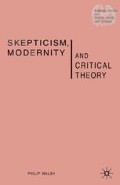Abstract
Scholarly interest in ancient skepticism has been resurgent in recent years. What had previously been dismissed as an obscure and eccentric offshoot of Stoic teachings has now come to be accepted as a subtle and challenging set of doctrines that has exerted a considerable, if somewhat hidden, influence on the course of modern philosophy1 This general revival of interest in the three main schools of Hellenistic philosophy, Stoicism, Epicureanism and Skepticism reveals, perhaps, as much of the character of our own age as it does of the Hellenistic age itself.2 Nevertheless, and in spite of the revived attention, ancient skepticism still remains resistant to our historical and philosophical understanding,3 due to several factors, not the least being that contemporary skepticism as a philosophical topic is generally considered to be the theoretical province of the analytic tradition, and this tradition is not renowned for its historicist or hermeneutic sensitivities. The key doctrines of ancient skepticism have often been presented with an inadequate respect for the historical context within which they arose and evolved; sins of interpretation already identified by Hegel in 1801 in his own investigation and interpretation of ancient skepticism.
Access this chapter
Tax calculation will be finalised at checkout
Purchases are for personal use only
Preview
Unable to display preview. Download preview PDF.
Notes
The resurgence follows especially the work of Alisdair MacIntyre, and the continuing attention accorded to Hannah Arendt’s focus on Greek ethics. Martha Nussbaum’s Therapy of Desire (Princeton, NJ: Princeton University Press, 1994), as I show here, has been influential in drawing attention to neglected aspects of Hellenistic philosophy in general.
There is significant disagreement regarding the most basic tenets of ancient skepticism. Probably the most widespread understanding is that it represents a form of phenomenalism, as Frede and Stough both argue (see Michael Frede, Essays in Ancient Philosophy (Princeton, NJ: Princeton University Press, 1995) pp. 179–225
and Charlotte Stough, Greek Skepticism (Berkeley and Los Angeles: University of California Press, 1969) pp. 67–97). For a criticism of this interpretation, in which it is attributed directly to historical insensitivity, see Burnyeat, “Can the Skeptic Live his Skepticism,” p. 127.
Cf. Gisela Striker, “Skeptical Strategies,” in Doubt and Dogmatism: Studies in Hellenistic Philosophy, ed. by M. Schofield, M.F. Burnyeat and J. Barnes (Oxford: Oxford University Press, 1980), pp. 54–83.
See Kant, Critique of Pure Reason, Axi note (a). For a review and critique of Schulze’s arguments in Aenesidemus, see Frederick Beiser, The Fate of Reason (Cambridge, MA: Harvard University Press, 1987), pp. 266–84.
See Isaiah Berlin, Against the Current (New York: Viking, 1980) p. 9.
Hamann is also the subject of a separate late essay by Berlin , The Magus of the North: J.G. Hamann and the Origins of Modern Irrationalism (New York: Farrar, Strauss & Giroux, 1994). On the influence of Hamann on later idealism, Cf. Beiser, The Fate of Reason, pp. 39–43.
See J.G. Fichte, “Review of Aenesidemus,” in Fichte: Early Philosophical Writings, trans. and ed. by Daniel Breazeale (Ithaca, NY: Cornell University Press, 1988), pp. 59–77.
G.W.F. Hegel, “On the Relationship of Skepticism to Philosophy, Exposition of its Different Modifications and Comparison of the Latest Form with the Ancient One,” in Between Kant and Hegel, trans. and ed. by H.S. Harris and G. DiGiovanni (Albany, NY: State University of New York Press, 1985), pp. 313–14.
David Hume, An Enquiry Concerning Human Understanding, in Hume’s Enquiries, ed. by L.A. Selby-Bigge (Oxford: Oxford University Press, 1975), p. 159.
Theodor W. Adorno, Hegel: Three Studies, trans. by Shierry Weber Nicholson (Cambridge, MA: MIT Press, 1993), p. 57.
See Sextus Empiricus, Outlines of Pyrrhonism, trans. and ed. by R.G. Bury (London: Heinemann, 1942), pp. 23–6.
Leo Strauss, Natural Right and History (Chicago, IL: University of Chicago Press, 1970), p. 20.
See David Sedley, “The Motivation of Greek Skepticism,” in The Skeptical Tradition, ed. by Miles Burnyeat (Berkeley and Los Angeles: University of California Press, 1983), p. 17.
Michael Forster, Hegel and Skepticism (Cambridge, MA: Harvard University Press, 1989), p. 35.
Ibid., p. 13. Cf. Alisdair MacIntyre, After Virtue: A Study in Moral Theory, 2nd edn (London: Duckworth, 1982), p. 148.
Cicero , Academica, trans. by H. Rackham (London: Heinemann, 1933), p. 561.
Copyright information
© 2005 Philip Walsh
About this chapter
Cite this chapter
Walsh, P. (2005). Idealism, Metacritique and Ancient Skepticism. In: Skepticism, Modernity and Critical Theory. Renewing Philosophy. Palgrave Macmillan, London. https://doi.org/10.1057/9780230505957_2
Download citation
DOI: https://doi.org/10.1057/9780230505957_2
Publisher Name: Palgrave Macmillan, London
Print ISBN: 978-1-349-51397-0
Online ISBN: 978-0-230-50595-7
eBook Packages: Palgrave Religion & Philosophy CollectionPhilosophy and Religion (R0)

